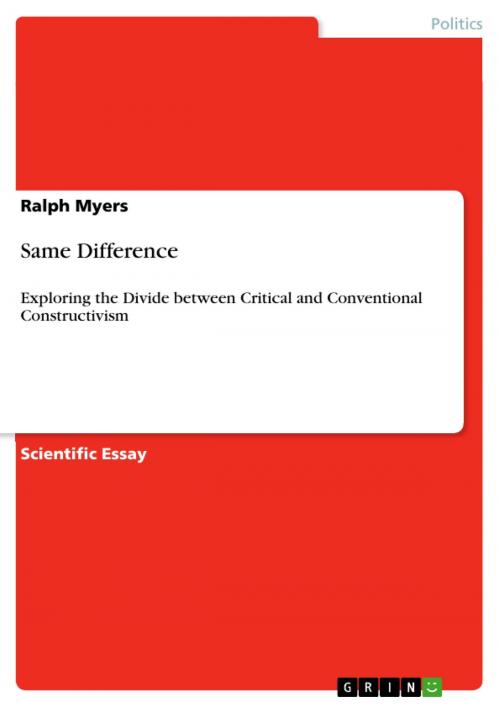Same Difference
Exploring the Divide between Critical and Conventional Constructivism
Nonfiction, Social & Cultural Studies, Political Science, Politics, History & Theory| Author: | Ralph Myers | ISBN: | 9783640755851 |
| Publisher: | GRIN Publishing | Publication: | November 19, 2010 |
| Imprint: | GRIN Publishing | Language: | English |
| Author: | Ralph Myers |
| ISBN: | 9783640755851 |
| Publisher: | GRIN Publishing |
| Publication: | November 19, 2010 |
| Imprint: | GRIN Publishing |
| Language: | English |
Scientific Essay from the year 2009 in the subject Politics - Political Theory and the History of Ideas Journal, grade: 77%, Dublin City University, course: International Relations, language: English, abstract: Same Difference: Exploring the Divide between Critical and Conventional Constructivism This paper explores the similarities and differences between the conventional and critical strands of constructivism within International Relation. It concludes that there is a serious cleavage between the two, even though they might appear to be similar. The first paragraph of this paper tries to define some of the concepts used in this paper, particularly the terms 'conventional constructivism', 'critical constructivism', 'research paradigm' and 'methodology'. The first part of the paragraph explains the importance of setting definitional parameters, in addition to suggesting an analogy to gain more appreciation for the cleavage, and particular the type of cleavage between critical and conventional strands that this paper will reveal. Then, using taxonomies put forward by a number of academics, the classification for both strands are given, in addition to identifying their most prominent academics. Definitions regarding methodology and research paradigm are examined through Kuhn's interpretation of paradigms. The second paragraph starts by giving an overview of similarities different academics have observed within the constructivist tradition. It focuses on the critique of positivism, interpretative methodology and the importance of socially constructed ideas. The third paragraph highlights the cleavage between critical and conventional constructivism. It argues that, although the position this paper classifies critical constructivists in a certain way which is rejected by some of those scholars, it is legitimised through Kuhn's interpretation of paradigms. Both differences in methodology and research paradigm are then exposed, and the main argument made is that critical constructivism is so radical that it not only alienates itself from other theories in IR but also conventional constructivism, using the aforementioned analogy to exemplify this.
Scientific Essay from the year 2009 in the subject Politics - Political Theory and the History of Ideas Journal, grade: 77%, Dublin City University, course: International Relations, language: English, abstract: Same Difference: Exploring the Divide between Critical and Conventional Constructivism This paper explores the similarities and differences between the conventional and critical strands of constructivism within International Relation. It concludes that there is a serious cleavage between the two, even though they might appear to be similar. The first paragraph of this paper tries to define some of the concepts used in this paper, particularly the terms 'conventional constructivism', 'critical constructivism', 'research paradigm' and 'methodology'. The first part of the paragraph explains the importance of setting definitional parameters, in addition to suggesting an analogy to gain more appreciation for the cleavage, and particular the type of cleavage between critical and conventional strands that this paper will reveal. Then, using taxonomies put forward by a number of academics, the classification for both strands are given, in addition to identifying their most prominent academics. Definitions regarding methodology and research paradigm are examined through Kuhn's interpretation of paradigms. The second paragraph starts by giving an overview of similarities different academics have observed within the constructivist tradition. It focuses on the critique of positivism, interpretative methodology and the importance of socially constructed ideas. The third paragraph highlights the cleavage between critical and conventional constructivism. It argues that, although the position this paper classifies critical constructivists in a certain way which is rejected by some of those scholars, it is legitimised through Kuhn's interpretation of paradigms. Both differences in methodology and research paradigm are then exposed, and the main argument made is that critical constructivism is so radical that it not only alienates itself from other theories in IR but also conventional constructivism, using the aforementioned analogy to exemplify this.















